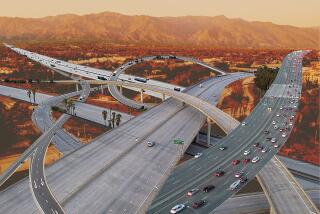Brilliant Ideas Die Like a Bad Engine
“I need to keep a journal in my car,” a friend of mine laments. “I have all these great ideas and the minute the engine’s off, they’re gone.”
I know exactly what he means. I have written novels in the car, songs and sonnets and Oscar-winning screenplays. Driving the streets of L.A., I have solved the dysfunctions of all my friends and their families, come up with the best theme for a kid’s birthday party ever, pinpointed the fatal flaw in the Al Gore campaign, solved global warming and figured out how to entertain eight unexpected dinner guests, including three vegans and a lactose intolerant, without resorting to takeout.
Then I take the key out of the ignition and presto-change-o, I’m back at my permanent residence--1313 Wit’s End.
I suspect it has something to do with the laws of inertia. A body in motion will stay in motion until acted upon by a force greater than itself and I suppose the same is true of a brain. No one has ever bothered to explain to me the neurological relationship between my brain and my brake pads, but it is a deep and abiding one. Perhaps it has more to do with the nature of imagination, which one always envisions as an active sort of creature, always taking flight or running away with one.
So if you put one moving body (the imagination) in another moving body (the car) the whole process goes into double time.
Like a child running on a moving sidewalk, you feel the euphoria of accelerated possibility, of existence outside the constraints of normal space and time. But when the sidewalk ends, there is inevitably that jolt that can send you sprawling. The wipeout after the rush.
Driving in L.A. is a bit like a drug, especially when you’re driving roads you’ve traveled for years. Just making a certain series of familiar turns can put you in the zone--without thinking about it, you’re on your way to work, or the store, or your brother’s house. Sometimes you find yourself halfway to a place that was not your original destination--I can’t count how many times I automatically headed for work even though it was Saturday and I had set out for the beach or Griffith Park.
But most days, it works out fine--one level of the mind is busy watching for red lights and reckless drivers, while another level is grappling with the great issues of our time. When are we as a nation ever going to address the health and child-care crises? How can I get Fiona to wear her Easter hat long enough to get her picture taken?
See, in the car, thoughts and images come with absolutely no strings attached. There is no one there to make you implement them on the spot, no boss hovering over your shoulder, no therapist pointing out the flaws of your argument. Transitions are unnecessary, exposition unimportant, everything is action and the things you will say and do later today or next week or some year glitter and shine with self-contained perfection.
That’s the perfect narrative structure for your novel and yes, you will be able to find 35 engineer hats for less than a dollar apiece. No doubt Jodie Foster will be thrilled to buy your film treatment and President Bush will see the wisdom of your argument, and, that’s it, you can make a delicious quiche with soy milk and, of course, that soy milk you bought last month is still good.
Smaller thoughts bob amid the grand schemes, sudden bursts of good intent--gotta get shoelaces, tomorrow is Mom’s birthday--and they too are wiped away like doodles on an Etch-a-Sketch when the car comes to a halt. Opening the door, it’s as if that half hour, or hour, or four hours had not occurred, as if the car had driven itself and you had slept right through it.
So maybe my friend is right. Just as some people reach for a journal the moment they wake to capture their nocturnal imaginings, maybe we should all have notebooks stashed in the glove compartment.
Fleet and telling, car dreams are still dreams, after all, and genius strikes at the most inopportune times, even, perhaps, while the guy in front of you is making a left out of the right-hand lane without bothering to use his turn signal.
Mary McNamara can be reached at [email protected].



